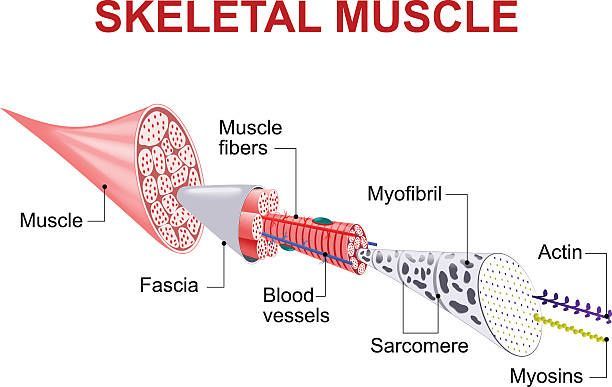Muscles, Massage & Yoga: How It All Works Together
I loved the academic part of massage school. It was fascinating to learn about each of our body’s systems and how they function for us. I thought it might be fun to write some blogs on the topic. Let me know if you’d like more of these in the future :)
Have you ever wondered why stretching feels so good, or how massage actually helps your body? Our muscles work hard for us every day—whether we’re sitting at a desk, practicing yoga sculpt, or carrying groceries. But how much do we really know about how they function?
In this blog, we’ll explore how muscles work, the benefits of stretching your muscles, and how massage therapy supports healthy, happy muscles.
How do Muscles Work?
Muscles are made of bundles of fibers that contract and relax to create movement. These muscle fibers are built from thousands of tiny protein filaments called actin and myosin, which slide past each other to generate force. This sliding is triggered by electrical signals from your brain and spinal cord, traveling through motor neurons.
There are over 600 skeletal muscles in your body, and they work in coordinated groups to move your bones, maintain posture, and stabilize joints.
Some key points:
- Skeletal muscles attach to bones via tendons and create movement when they contract.
- Muscles work in pairs: when one contracts, the opposing muscle relaxes (agonist/antagonist relationship).
- Muscles adapt: they grow stronger with use and tighter or weaker with disuse or overuse.
- Fascia, the connective tissue surrounding muscles, helps hold structure but can become stiff or “stuck” without proper movement and hydration.
When muscles get overworked, underused, or stressed (physically or emotionally), they can become shortened, knotted, or restricted—which affects posture, performance, and even mood.

Why Do We Stretch Muscles?
Stretching is more than just a warm-up or cool-down (or a yoga class!). It’s an essential part of keeping your muscles functioning properly. Here’s why stretching matters:
Maintains Flexibility & Range of Motion
Stretching helps lengthen muscle fibers and fascia, which can become shortened or sticky from repetitive use. This prevents stiffness and keeps your joints moving freely.
Reduces Risk of Injury
Tight muscles can pull on joints or other muscles and increase your risk of strains, sprains, or imbalances. Stretching keeps tissues more pliable and responsive.
Improves Circulation
Stretching encourages blood and lymph flow, helping deliver oxygen to tissues and remove metabolic waste like lactic acid.
Releases Tension and Stress
Muscles often hold emotional stress—especially in the neck, shoulders, hips, and jaw. Stretching these areas can calm the nervous system and help you feel more relaxed.
Increases Body Awareness
Stretching helps you tune into where you’re tight or out of balance, allowing you to adjust your posture, movement habits, or self-care accordingly.
How Does Massage Improve Muscle Function?

Massage is like giving your muscular system a tune-up. It works with both muscle tissue and fascia to restore flexibility, balance, and comfort.
Releases Muscle Tension & Trigger Points
Massage helps release knots (adhesions) in the muscle and fascia, allowing fibers to slide more freely. This reduces tightness and restores natural length and movement.
Boosts Circulation
Massage stimulates blood flow, delivering nutrients and oxygen to muscles while helping remove built-up waste. It also supports the lymphatic system, reducing inflammation and swelling.
Promotes Balance & Alignment
By relaxing overused muscles and activating underused ones, massage helps correct muscle imbalances that can affect posture and performance.
Supports the Nervous System
Massage triggers the parasympathetic nervous system—the “rest and digest” side that also gets activated during a yoga class. This calms your body, reduces stress hormones, and helps your muscles let go of tension.
Enhances Recovery
Whether you’re an athlete or recovering from a long workweek, massage can reduce soreness, speed up tissue repair, and restore movement efficiency.
Yoga & Massage: Better Together
Think of yoga as your daily self-maintenance and massage as your deeper reset. They’re powerful individually—but together, they keep your muscles long, strong, and balanced.
Benefits of combining the two:
- Easier, more effective stretching after massage
- Longer-lasting relief from tightness or pain
- Increased body awareness and prevention of chronic issues
- Enhanced performance and mobility in daily life or sport
Final Thoughts
Your muscles are always working for you—whether you’re moving, sitting, or even sleeping. When they’re taken care of, you’ll feel the difference in how you move, breathe, and live.
Want to give your muscles the care they deserve? Book a private yoga session or massage today. Better yet, book both together and get a 10% off discount.
On the Blog



